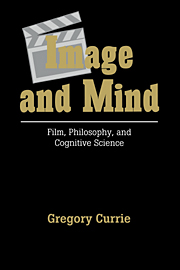Book contents
- Frontmatter
- Contents
- Preface
- Acknowledgements
- Film, 1895–1995
- Image and mind
- Introduction: the essence of cinema
- Part I Representation in film
- Part II Imagination
- Part III Interpretation
- Chapter 8 The interpretive problem
- Chapter 9 Narrative and narrators
- In conclusion
- Named propositions
- Bibliography
- Index
Chapter 8 - The interpretive problem
Published online by Cambridge University Press: 28 October 2009
- Frontmatter
- Contents
- Preface
- Acknowledgements
- Film, 1895–1995
- Image and mind
- Introduction: the essence of cinema
- Part I Representation in film
- Part II Imagination
- Part III Interpretation
- Chapter 8 The interpretive problem
- Chapter 9 Narrative and narrators
- In conclusion
- Named propositions
- Bibliography
- Index
Summary
Even if we reject the thesis that creative interpretation aims to discover some actual historical intention, the concept of intention nevertheless provides the formal structure for all interpretive claims. I mean that an interpretation is by nature a report of a purpose.
Ronald DworkinThe subject of this chapter is a problem and how we solve it. The problem I shall call the interpretive problem, and it is this: an interpreter starts with something and ends with something else. The interpreter of a novel starts with a text – a sequence of words and sentences – and ends with a story: the story which, as the reader/interpreter sees it, is told by that text. The interpreter of a film starts with a sequence of cinematic images and their auditory accompaniments, and ends with a story: the story which, as the viewer/interpreter sees it, is told by those images and sounds. The interpretive problem is how to get from the one to the other. The philosopher's problem is to give an abstract characterization of the principles and methodological rules in accordance with which interpreters solve the interpretive problem. In solving the philosopher's problem, we give a theory of interpretation.
The interpretive problem looks so forbiddingly difficult it can seem astonishing it ever gets solved at all. In the filmic case, images succeed one another quickly, the film cutting across large chunks of space and time. Sometimes the narrative is reshuffled, as with flashback. Usually this goes on without any explicit commentary or other onscreen direction to indicate the relation between successive images.
- Type
- Chapter
- Information
- Image and MindFilm, Philosophy and Cognitive Science, pp. 225 - 259Publisher: Cambridge University PressPrint publication year: 1995



